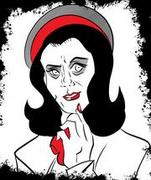|
Blast Fantasto posted:Do the Right Thing and Malcolm X are two of the greatest films of all time. Recently, I thought Chi-Raq was fun. I rewatched Do The Right Thing a couple of years back, and it still remains such a bright, energized movie. Like that movie just rips. Has anyone seen 25th Hour recently? That was a movie that dropped in my formative high school years, and really had an impact on me when I saw it. But I’m curious how it holds up; if it legit has legs, or is just one of those movies very much of its time and place. I keep meaning to give it a rewatch, but it always gets shuffled under other, newer releases on my to-do list.
|
|
|
|

|
| # ¿ May 22, 2024 13:47 |
|
K. Waste posted:I like the part in the movie where they're just talking about blaxploitation films, and how the only heroes for black folks are either cops or pimps. Counterbalanced with this repulsive screening of The Birth of a Nation isn't just the parallel scene of Belafonte's character describing the lynching of Jesse Washington, but also the whole scene of the undercover cop and the radical activist talking about blaxploitation movies, and coming to the irony of how these movies are often specifically either presenting the black hero as a cop or private detective or otherwise; or else they are, while still being the "heroes," horribly misogynistic pimps and pushers. The anachronistic references to films that hadn't even been released yet is great, and it's interesting how this scene itself even follows up on the one where Ture describes watching Tarzan movies and cheering on the white man brutalizing natives. Yeah, I was so glad I had previously read Du Bois when I was watching the film. The film works perfectly fine on its own, but it also being a big thesis on the idea of double consciousness and the mobility and limitations afforded by that really gives it another level of depth. Like the entire thrust of the narrative is Stallworth weaponizing the social constraints placed upon him for the purpose of subterfuge, which allows him to do good, but it is a good that ideally would be unnecessary entirely in a better, more fair world. He’s forced to present himself as an Other self in order to make the world a better place, but the world would be a better place if that forced presentation was not an expectation or means of survival to begin with.
|
|
|
|
Saw this again tonight with a buddy who wanted to catch it in theaters, and it plays just as strongly on a second viewing. What really struck me on the second viewing is how powerfully effective the last fifteen minutes or so are: there's this kind of dreamlike quality to Ron walking into the police station after stopping the bombing, where everyone is giving him accolades. This is followed by the comedown of the chief revealing that they're scuttling any further investigation into the KKK, and that the actual investigation itself has to be buried. . But then, you have this kind of crowd-pleasing moment with Ron ripping David Duke a new one over the phone while revealing he's black, which got a legit round of applause in the audience. Which is then followed immediately by the footage of Charlottesville, and all of the absolute horror that involves. It's a very sobering way to present the actual reality of social progress: it's called a "struggle" for a reason. Successes are few and far between, and there are always more obstacles waiting around the corner. There's no fistpump moment coming for what we're seeing in the world today; whatever victories are marked against white supremacy in the future will be accomplished only through arduous dedication to the cause and the work. The road to a better world is not measured in miles, but inches. But every inch is a powerful, world-changing event to be treasured unto itself.
|
|
|
|
BravestOfTheLamps posted:The movie sounds like sop for today's progressives who think they're like the black militants and civil rights campaigners of yesteryear for opposing Donald Trump or something. e: But I guess I should still see it. Yes, it would probably be a good idea to actually see the movie you want to have opinions about in a discussion.
|
|
|
|
Hand Knit posted:I think you can be a bit more charitable, and say that at best it's part of a quick series of denied happy endings. The point is to underline that confronting fascistic racism isn't over, and there are still battles to be fought. This was my read too. The denied happy endings also have kind of a dreamlike quality to them in that they're just a little too perfect. They almost play out like fantasy in how absolute the two individuals on the receiving end are burned. But like that kind of felt like the intended point. Whatever victories come on the road to social progress are both immense and powerful, but also simultaneously fleeting and fragile. You keep fighting, but there's always a second punch coming.
|
|
|



